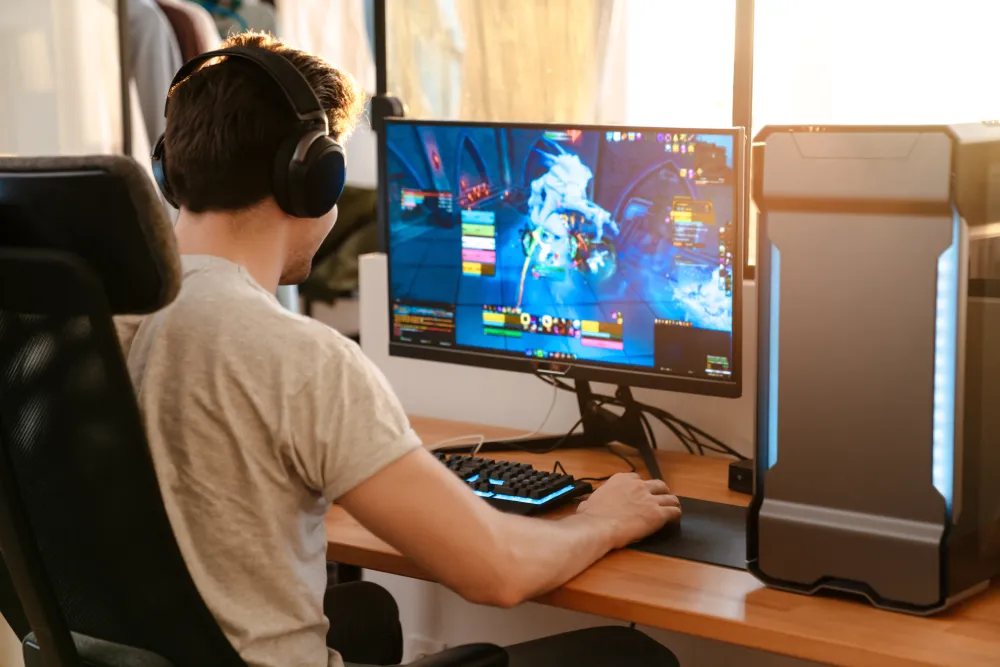Successful games impress with state-of-the-art graphics, great sound, flawless programming – and increasingly with awesome stories. However, the storytelling suffers if it is poorly translated. Localization errors are not only annoying but also destroy the most valuable asset of games: immersion. Why you should leave the linguistic translation of games to the professionals.
The figures are staggering: By 2022 at the latest, global sales of video games across all categories had exceededthe 200 billion euro mark. In Germany alone, the largest gaming market within the EU, this amounts to around ten billion euros – a figure that exceeds the cumulative sales of books, movies, and music in Germany.
And what does that have to do with translation? Anyone who grew up with Pong, Pac-Man, and Tetris on a console or PC will have experienced a time when languages played no role in the gaming context. Their importance grew in parallel with the evolution of gaming culture towards storytelling: With simple, non-graphic text adventures of the early years, “computer games” on PCs suddenly began to tell players stories. And this also brought languages into focus.
Immersion increases the fun of the game
The concept of immersion is at the heart of the gaming experience. The term “immersion” can be defined as the “state of being deeply engaged or involved”. In fact, immersion is one of the most powerful qualities that a game can possess. If a game manages to captivate gamers to the extent that they literally forget everything around them, it is already one step closer to success. More and more games link immersion to the story and thus to the spoken or subtitled text – across all game categories. Anyone who has had the pleasure of playing games like The Last of Us, Ghost of Tsushima, or Detroit: Become Human, knows the importance of good stories and well-translated texts.
The global dominance and popularity of US developer studios are both well-known and unchanging. Those who have mastered the subtleties of the English language often have no need for a translation. However, most non-native speakers will opt to experience the game in their native language instead of English. In many cases, the linguistic regionalization is extremely successful. Nevertheless, we are constantly surprised by games that are released with horrendous errors in the target language. And this isn’t just confined to “small” games – expensive triple-A titles are also affected.
Language check: Why “beaming” is not the same as “radiating”
What applies to translation in general also applies in the gaming sector: good translations are only successful if they are backed up by knowledge of the subject and its history in addition to excellent language skills. If this is not the case, things can quickly become embarrassing. The Star Trek universe offers a nice selection of examples. What began in 1966 as a low-budget TV product that attracted little attention at the time has developed into one of the most powerful global sci-fi franchises. In addition to other series, movies, and extensive merchandising, Star Trek has also released a long list of games. This has also resulted in a fanbase that is used to iconic technical terms in each language.
The year 1997 saw the release of Star Trek: Starfleet Academy, a technically impressive game considering what was on offer at the time. However, the German version caused some ripples. Among other things, the English word “beaming” used in connection with the fictional process of teleportation by means of a transporter was translated in German as “Strahlen,” which means “radiate”. For connoisseurs and fans of the series, this translation is almost an act of heresy. And in the game’s intro, the legendary phrase from the series’ opening credits was translated as “to boldly go to worlds where no one has gone before” instead of “to boldly go where no one has gone before” and the famous “Romulan Neutral Zone” is referred to simply as the “Neutral Zone.” One can only assume that the translator(s) were simply unfamiliar with the world of Star Trek.
Mistranslations as immersion killers
However, those who are truly immersed in the world of poor game translations will soon find these errors relatively forgivable. An astonishing number of games have been and continue to be translated in a completely unprofessional manner, which in some cases is probably due to automation. In one part of the Counter-Strike series – which remains one of the world’s most important e-sports franchises – you warn your opponents of an approaching hand grenade with the German phrase “Feuer im Loch!” Despite being a faithful translation of the English phrase “Fire in the hole!,” this is utterly incomprehensible to a German-speaker. A more appropriate translation would have been “In Deckung!,” which signals nothing other than “Take cover!” to the players. Another wonderful example comes from Metal Gear Solid 3: Snake Eater. While a deceased woman is referred to as a “Traitor with no sense of honor” in the original English version, the subtitles in German refer to a woman “with no sense of humor.” Perhaps it was a special kind of humor? However, there was nothing funny about its effect on player immersion.
The top ten: Worst game translations
A selection of the most impressive translation fails can only ever be a work in progress. That being said, we can’t resist sharing a few highlights from gaming history to date that show how poor translation can turn even the best products into a laughing stock.
Number 10: Thou shalt yield to oaks
Archlord, an online role-playing game that features orcs – evil creatures from Tolkien’s underworld – was launched in 2006. Unfortunately, the translator wasn’t entirely fluent in the realms of fantasy or language. As a result, they translated “orcs” throughout as “Eichen,” meaning “oaks.”
Number 9: Poor button support
In the third-person shooter Stranglehold from 2007, players are constantly required to open doors. Clearly, these can either be pushed open or pulled open, but this obviously caused problems in the German translation. That’s because the two terms are consistently interchanged. Among other things, this results in bizarre instructions such as “Pull space bar!” or “Pull right mouse button!”.
Number 8: Incorrect blood
Sometimes translation problems that are already familiar from movies also crop up in games. Sylvester Stallone’s first Rambo film is called “First Blood” – a quote from the movie. This is because the sentence “They drew first blood” is used in English, which means nothing other than “They started” in German. Nevertheless, the nonsensical German translation “Erstes Blut” (first blood) also appears in Unreal Tournament 3.
Number 7: It’s a dirty job…
Soccer and other sports simulations have reached a level of graphic sophistication that comes very close to photographic reality. However, Champion World Class Soccer from 1983 had not yet progressed to this level. The German language version also dropped the ball in certain respects. If a game is still undecided after extra time, the message “Elfmeterscheissen” is displayed in capital letters across the screen in the German version. “Elfmeterschiessen” is the German word for “penalty shootout”. Unfortunately, if the letters “ie” are flipped around to become “ei,” the players will have to perform a “penalty sh#t”.
Number 6: Gardening with friends
The game “Alone in the Dark: Illumination” is generally not considered a highlight in the survival horror game category, but the translation errors are truly terrifying. One of the many gems: A player is instructed to plant explosives with the delightful German phrase “Pflanzen Sprengstoff” (“Flowers Explosive”).
Number 5: Nocturnal shenanigans
The 2016 indie game Salt & Sanctuary received very positive reviews, but the German translation was a flop. One example among many: Gamers are informed that a ship has been boarded with the following award-winning German text, which translates as follows: “We were mounted during the night.” We’ll leave it to you to imagine what that entailed.
Number 4: When your teammates put on pounds
Some translation errors are no longer noticeable once you get used to them. In the Pokémon game series, the “Slap” is one of countless attack variants. In the first generations of the game, however, the slap was translated using the German unit of weight “Pfund”. This was obviously a poor translation of the English verb “pound” – which would be “schlagen” in German.
Number 3: Looking for trees
In The Legend of Kyrandia, a point-and-click game from the 1990s, a dragon searches for three quest items: “Where is the other three?” The German translation “Wo ist der andere Baum?” (“Where is the other tree”) probably leaves most players scratching their heads.
Number 2: A problematic coffee delivery
Sometimes, political correctness can also lead to translation errors. The Japanese role-playing game Grandia from 1997 includes references to alcohol in the source language. This was immediately replaced by “coffee” in the US version. After all, young people need to be protected! These good intentions somehow made their way into the German version. As a result, one character in the game suffers from a real “coffee problem”.
Number 1: All mine!
Even if there are no prizes to be won in this competition, First place in this selection goes to a translation error whose brilliant English has even earned it a dedicated Wikipedia entry. Zero Wing, a Japanese shoot ’em up from 1989, is full of glaring linguistic blunders in several versions – one of which became legendary: “All your base are belong to us.” The bizarre sentence became an Internet meme, appeared as an Easter egg in other games, became part of a techno track, made it into articles in newspapers, and was quoted in movies and advertising. Chapeau!







